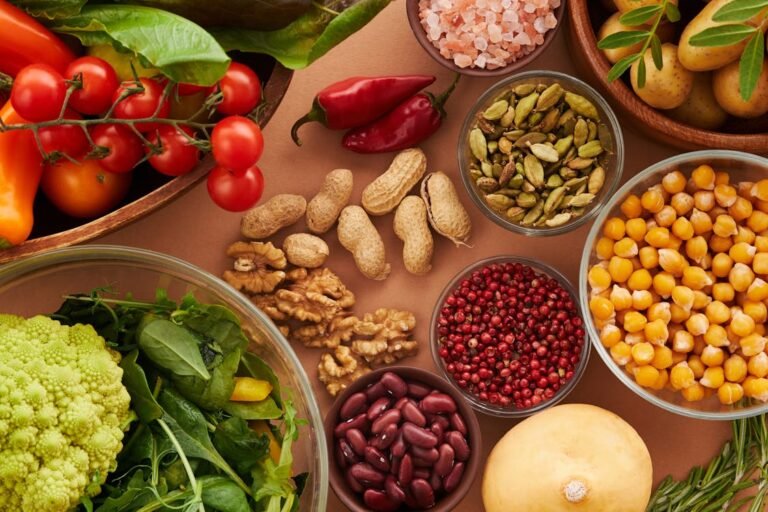Follow us and share.
Plant-Based Eating: Benefits, Risks, and How to Make the Transition
Discover the benefits of a plant-based diet, its risks, and how to make the transition safely and in a balanced way.

More and more people are opting for a plant-based diet, whether for health, ethical, sustainable, or personal preference reasons. This nutritional approach prioritizes the consumption of plant-based foods such as fruits, vegetables, legumes, whole grains, nuts, and seeds, and reduces or eliminates the consumption of animal products. But how beneficial is this diet? Are there risks? How can it be adopted in a safe and balanced way? In this article, we answer all these questions.
📌 What is a plant-based diet and why is it on the rise?
A plant-based diet isn't necessarily vegan or vegetarian. While many people adopt it as a way to completely eliminate animal products, others simply reduce their consumption significantly, without eliminating them entirely.
This trend has grown in recent years for several reasons:
- Health: It is associated with a lower risk of chronic diseases and a better quality of life.
- Environmental awareness: It produces a lower ecological footprint, reduces greenhouse gas emissions, and requires fewer natural resources.
- Animal Ethics: Prevents animal suffering in the food industry and promotes respect for other forms of life.
- Access to information: Greater availability of educational content, documentaries, social media, books, and alternative products.
Scientific evidence supports that a well-planned, plant-based diet can meet all of the body's nutritional needs and offer short- and long-term benefits.
📌 Proven health benefits
Studies show that a plant-based diet can provide multiple benefits:
- Reducing cardiovascular risk: Thanks to the lower intake of saturated fat and cholesterol, and the high content of fiber, phytochemicals, and antioxidants present in fruits, vegetables, and whole grains.
- Better body weight control: Plant-based diets tend to have lower caloric density and greater satiating volume, which helps prevent overweight and obesity.
- Preventing Type 2 Diabetes: Improves insulin sensitivity, regulates glucose levels and reduces blood sugar spikes.
- Reduction of blood pressure: Due to its richness in potassium, magnesium, fiber and low sodium intake in natural foods.
- Digestive health: Plant fiber improves intestinal transit, regulates cholesterol, and promotes a healthy intestinal microbiota.
Furthermore, some research suggests that it may reduce the risk of certain types of cancer (colon, breast, prostate) and contribute to greater longevity, provided it is properly balanced.
📌 Risks and critical nutrients to watch out for
A plant-based diet must be planned properly to avoid nutritional deficiencies. The most critical nutrients that require attention are:
- Vitamin B12: It's not found in plant foods. Supplementation with capsules, drops, or fortified foods is essential.
- Iron: Plant-based (non-heme) iron is absorbed less efficiently than animal-based iron. It's recommended to combine it with foods rich in vitamin C, such as citrus fruits, kiwis, or tomatoes.
- Calcium: Plant sources such as tofu, almonds, broccoli, kale, and fortified plant-based beverages are essential.
- Omega-3 (ALA, EPA and DHA): Plant sources such as chia, flaxseed, walnuts, and flaxseed oil provide ALA, but conversion to EPA and DHA can be limited. Considering a DHA supplement from microalgae is recommended.
- Zinc and iodine: They can also be limiting if you don't choose a variety of plant-based foods. Legumes, whole grains, and seaweed (such as nori) can help.
- Complete protein: By combining legumes with cereals (such as rice and lentils), you obtain all the essential amino acids.
Consulting a nutritionist is an excellent decision when starting this lifestyle, especially for children, pregnant women, athletes, or people with chronic illnesses.
📌 Practical tips for making the transition
Changing your eating habits can be challenging at first. Here are some suggestions for making it gradual, safe, and enjoyable:
- Start slowly: You can start with a “meatless Monday,” eating plant-based lunches or 100% plant-based dinners three times a week.
- Explore new recipes: Plant-based cooking can be very varied, tasty, and creative. It uses spices, fresh herbs, and new combinations.
- Read labels carefully: Many processed “plant” products may have excess sodium, unhealthy oils, or added sugars.
- Use smart substitutes: Tofu, tempeh, seitan, or legumes can replace meat in many traditional recipes.
- Includes foods from all groups: Be sure to include sources of protein, iron, calcium, healthy fats, and complex carbohydrates.
- Listen to your body: Observe how you feel, be patient during the process, and adapt your diet to your physical, emotional, and cultural needs.
It's a personal, flexible, and transformative path. It's not about being "perfect," but about being conscious and consistent.
💡 Final Reflection: Eating more plants is a health and conscious choice
Adopting a plant-based diet is more than a fad. It's a informed, conscious choice aligned with personal and planetary well-beingIt's not about eliminating, but about enriching: more colors, more flavors, more life.
With planning, variety, and education, this type of diet can be as nutritious as it is satisfying. Choosing more plant-based foods is a powerful step toward a healthier, more ethical, and sustainable lifestyle. Your health, the planet, and future generations benefit from every greener plate you choose to incorporate.
Meta description: Discover the benefits of a plant-based diet, its risks, and how to make the transition safely and in a balanced way.



